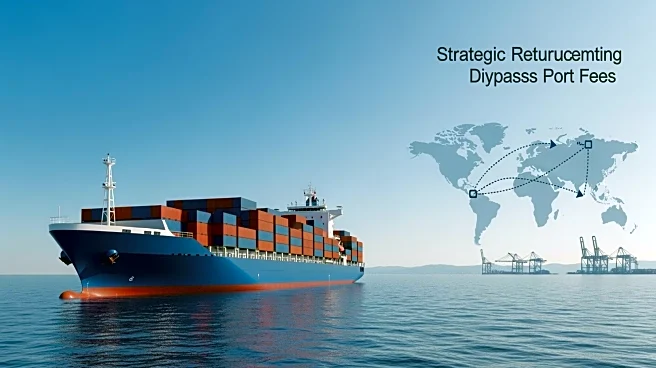What's Happening?
Several shipping companies have taken steps to restructure their ownership and board composition in response to China's special port fee programs. These measures aim to prevent being classified as 'US-controlled'
by Chinese authorities, which could subject them to additional fees. Companies like Costamare and Costamare Bulkers have increased the voting power of their majority owner, Konstantinos Konstantakopoulos, to avoid exceeding ownership thresholds that trigger the fees. Other companies have accepted the resignations of American directors and amended stock rights programs to protect against the fees. These actions reflect the industry's response to the uncertainties created by the port fee programs.
Why It's Important?
The restructuring efforts by shipping companies highlight the impact of geopolitical tensions on global trade and business operations. The port fee programs introduced by China and the US have created uncertainties for companies operating in the maritime industry, prompting them to take measures to protect their interests. These actions underscore the challenges faced by businesses in navigating complex international regulations and the potential financial implications of being classified as 'US-controlled.' The situation reflects broader trade tensions between the US and China, which could affect global supply chains and economic stability.
What's Next?
Shipping companies are likely to continue monitoring the situation and adjusting their strategies to mitigate the impact of the port fee programs. The US and China may engage in further negotiations to address trade tensions, with potential implications for the maritime industry. Companies may explore additional measures, such as redeploying ships or altering port call schedules, to avoid fees. The situation underscores the need for businesses to remain adaptable in the face of changing international regulations and geopolitical dynamics.
Beyond the Headlines
The restructuring efforts raise questions about the influence of geopolitical tensions on corporate governance and business strategy. The actions taken by shipping companies reflect the broader challenges faced by businesses in navigating complex international regulations and the potential financial implications of geopolitical conflicts. The situation highlights the importance of strategic planning and risk management in the face of global uncertainties, as companies seek to protect their interests and maintain operational stability.











